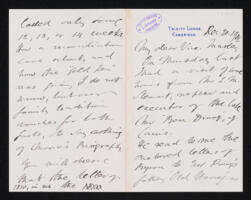A play about an unsuccessful man who buys a wish-granting gourd in Portobello Road.
Harrow. - His brother Frank has been passed over by the Bishop of Winchester; would Houghton consider him for vacant Bishopric of Chester?
Thanks for photographs
Trinity Lodge, Cambridge.—Encloses six letters (2–7) written by Lord Byron to Henry Drury, which have been bequeathed to the college by the son of the recipient.
—————
Transcript
Trinity Lodge, Cambridge
Dec. 20. 1902
My dear Vice-Master,
On Thursday last {1} I had a visit of some hours from Mr L. M. Stewart, nephew and executor of the late Mr “Ben Drury,” of Caius {2}.
He read to me the enclosed letters of Byron to Mr Drury’s father, “Old Harry” as he was called at Harrow, a Son of Dr Joseph Drury the Head Master.
He left out one sentence in one letter about the Turks, which he told me was disgusting {3}, and I have not seen it.
The letters date between 1807 {4}, when the Hours of Idleness were published, and 1815 soon after Byron’s Marriage.
As there are numerous references to my Father, it may be well just to point out that my Father succeeded Dr Drury at Easter, 1805, and that Byron left the School that summer, i.e. I suppose, at the end of July. Consequently, their relation as Master and Pupil lasted only some 12, 13, or 14 weeks. How a reconciliation came about, and how the “gold pen” was given, I do not know, but our family tradition vouches for both facts, to say nothing of Moore’s Biography.
You will observe that the letter of 1810, in wh. the {5} reference to the “gold pen” occurs, describes the famous swim from Sestos to Abydos, and adds—what I had either not known or forgotten—that the swimmer had made a previous attempt which failed.
May I ask you and Dr Sinker kindly to take Charge of the letters, which Mr Benjamin Drury bequeathed to our Library, and to consider where and in what form they may best be kept. The fact that they are a bequest should be specially recorded.
Perhaps it might also be recorded that Dr Joseph Drury, the Grandfather of the Testator, was himself a Trinity man. His Son, “Old Harry,” to whom Byron wrote the letters, was at Eton and King’s.
I am, my dear Vice-Master,
Most truly yours
H. Montagu Butler
—————
2 folded sheets.
{1} The 18th.
{2} Benjamin Drury’s sister Emily (1813–1902) married Stewart’s father, Lestock Wilson Stewart (1824–1876), an army doctor, in India in 1852.
{3} See the letter of 3 May 1810 (R.2.40A/4). Stewart may well have omitted more than one sentence.
{4} The earliest of the letters (R.2.40A/2) in fact dates from 13 January 1808, but it was misdated 1807.
{5} ‘1810’ struck through.
Marked with the number ‘2’ and labelled by R. H. Inglis Palgrave as follows: ‘Letters, perhaps not so important as those in the other parcel, but also very useful in explaining the early history of the writer.’
(Four messages, including two from Lady Palgrave.)
